Bayswater Boilers: team spirit through good times and bad
They started as a mums’ netball side – but their mateship and solidarity has endured through all of life’s joys and heartaches.
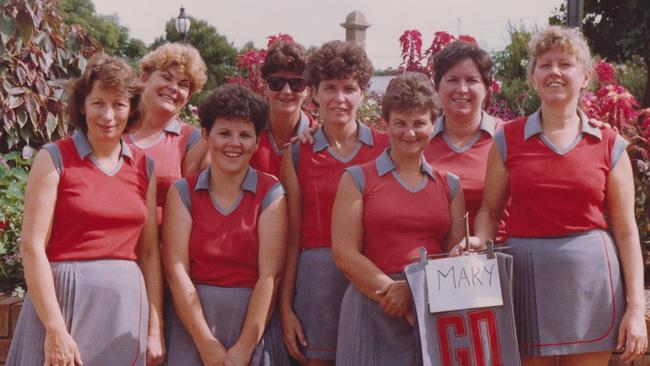
“Here if ya need.” Not the most intimidating sporting team motto ever conceived. Not really the kind of words that would instil fear in most opposition community netball teams – but fear was never really what the Bayswater Boilers were about. The Boilers were about being there. For the game. For the release. For the friendship. “Here if ya need.” That’s just something a Boilers wing attack might have hollered on-court to her zippy centre. “Here if ya need.” That meant a fellow team member was open. She was ready to receive the ball. Ready to help.
The Bayswater Boilers have been saying those words since 1984, through two decades of netball fixtures that only ended because of silly things like bone and gravity and lung capacity and time that never seemed to stop for the Boilers no matter how often they threatened to kick its backside. The netball games stopped on April 8, 2000, and there was a formal wake to recognise the end of regular fixtures but the team did not break up. They stayed together and that unofficial team motto became something less about sport than about life.
Sue Nielson, goal attack, 65, remembers when her son was tangled up in a drug addiction so all-consuming that some days she saw no future for her beautiful boy. She remembers the way her best friends, her beloved Bayswater Boilers, rallied around in her darkest hour. She remembers the words they kept telling her. Words to cling to always. To lift a woman up. “Here if ya need.”
“It’s like our catchcry,” says Julie Rouse, centre, 69. “It means we won’t ever over-involve ourselves in someone else’s life but every Boiler knows if they ever need anything, we’ll all be there.”
Wendy Goodman, wing defence, 69, remembers what it felt like to have her heart broken into a million tiny pieces in her 40s when her husband left and she remembers what it felt like to have that heart glued back together again by a wild and frequently hilarious group of women who were mothers, wives, workers and netball players. They did not pry. They did not ask Wendy to spill the gory details. They simply said, “Here if ya need.”
The Boilers have said those words for close to four decades now. Through motherhood, depression, divorce, cancer, through all of life and then through death. I am ready, the words say. I am open, I always have been and I always will be here if ya need.
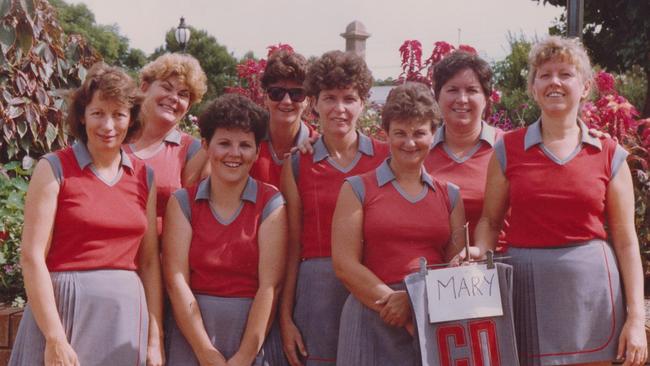
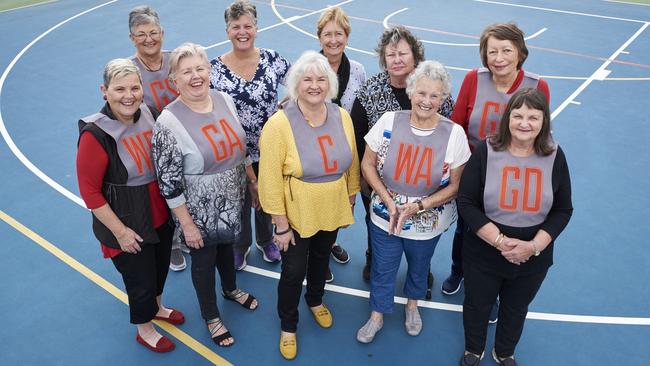
Bayswater is a suburb 6km north-east of Perth’s CBD. By Sue Nielson’s reckoning the Bayswater Boilers began in early 1984 when her daughter, Jane, attended the same kindergarten as Marg Twohig’s daughter, Jacinta. Marg said she and a couple of friends were starting a netball team and she wondered if Sue would like to join them. Easier said than done for a mother of three in 1984. Sue was helping her husband, Peter, establish a small engineering business. “He was making fruit produce machinery,” Sue says. “We had nothing, absolutely nothing. I remember one night he must have been making a conveyor belt for someone who grew cauliflowers and he brought home this crate of cauliflowers. We had cauliflower soup, curried cauliflower, roasted cauliflower for weeks. We just had nothing to make ends meet. There was so much on our plates that netball seemed like a great opportunity for me to think about other things and not about whatever was going on at home.”
Every Boiler has their particular traits and tics. Valmai Weiss, centre, says Sue “must know the ins and outs of every duck’s bum” and Sue is the first to admit Valmai’s right. Sue’s a nurse at Perth’s St John of God Hospital. She’s a Kiwi-born Australian. Almost 20 years ago the Boilers gave her an unofficial Australian citizenship ceremony in which she was bestowed various NZ-to-Oz “replacement” gifts: jandals making way for thongs, Vegemite replacing Marmite. Sue’s the great Boiler organiser, the tireless motivator who’s always the one instigating the biannual Boilers getaways up and down the West Australian coast.
It was Sue who sent through an email to this magazine some weeks back that spoke of her gratitude for her dear friends, the Boilers, during lockdown. We chatted on the phone and Sue spoke about how bad times crystallise good things. Family and friends and that’ll just about do it. She spoke about how the Boilers came together as a disparate group of young mums with varying personalities but similar goals: to be happy, to be kind, to get through the early slog of motherhood. Then she said something deep and powerful about how time – 36 long and eventful years – can take a simple friendship group like the Bayswater Boilers and turn it into something profound. And maybe there was a story in that certain something that keeps teams like the Boilers together so long; those suburban sporting teams found in every park across Australia that will not die but will change and morph and build into something far more important; something bigger than the sum of their bib-sporting parts.
Sue said that certain something could be found in the old team photo she later sent through on an email. Eight women in red-and-grey netball uniforms. Mid-1980s. All of life ahead of them. Tragedy and bliss. Sorrow and joy. Leonie Barrodean, goal shooter, second from the left. Smile as big as her heart. On-court joke teller. The Boiler most likely to let an accidental “Awwww shit!” slip from the shooter’s circle. The life of every party. The life of the Boilers. Leonie died in 2011.
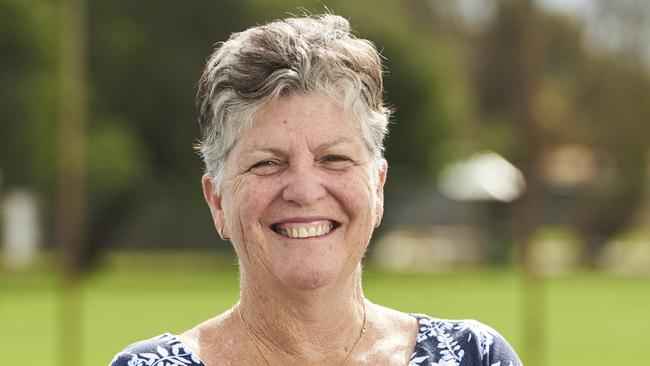
Julie Rouse is one of three Julies in the Boilers: Julie R, Julie D and Julie O. Julie R, fourth from right, is 69, has worked hard all her adult life in difficult roles for Western Australia’s Department of Child Protection and Department of Justice. The Boilers have always been Julie R’s release, and her rock. “I remember my mother-in-law’s funeral,” she says. “Three or four Boilers just turned up out of the blue with stuff for the morning tea after. Most of those girls didn’t know my mother-in-law. But there they were that day, arms filled with scones and cakes. That’s the nature of the Boilers.”
Valmai Weiss, centre, third from the right in the photo. Team treasurer. Every player gave $10 to Valmai on payday to fund the team GWA. Girls’ Weekends Away. Valmai was always the one who knew the stats. Facts and figures. A sharp mind and a samurai wit. But lately Valmai’s big mind has been letting her down. She keeps forgetting things. Keeps repeating the same stories to Evelyn on the phone. “That’s what annoys me,” Evelyn says. “We all have to lose things along the way.”
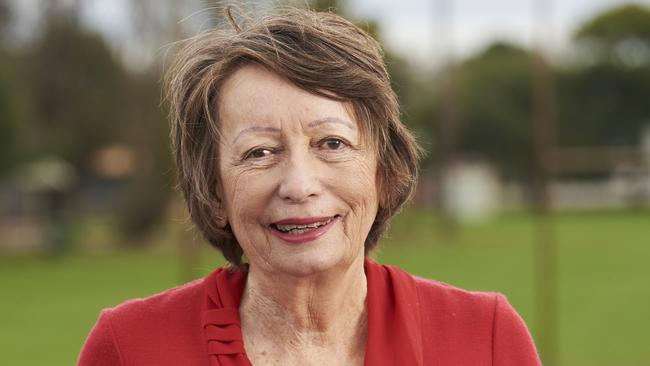
But so many things are found, too. Marg Twohig, goal keeper, 73, on the far left of the photo. “Look, the whole thing has been a story of how important friendship is,” she says. Marg remembers the Boilers having their first training sessions in the Bayswater Drill Hall on Murray Street, where soldiers of the Great War once trained for the battlefront. Marg was a fierce keeper. She’d played netball since the age of 11. Strong. Reliable. Always leading from the back. A stay-at-home mum of three kids. Her husband, David, worked at the Commonwealth Bank.
“Training lasted only a few weeks because we were all young mothers with children,” Marg says. “We didn’t have too much time to train, so we just used to turn up and play and tried to make it work as we went. We weren’t very good at first.”
Evelyn Rowe, goal attack, 69, second from the right in the old photo. A nurse. Mother of two. Seasoned traveller. Her husband, David, used to cook for the miners up in northern WA, and was often away for long stretches. Evelyn remembers the first Boilers getaway. A day trip for players and their families to the timber town of Dwellingup, south of Perth. One of the Boilers’ husbands said he could organise a bus that could carry more than 20 people but there was a slight catch. The bus belonged to a pastor friend and emblazoned boldly across the side of it were the words, “JESUS LIVES!”
“I mean, we were probably the most unreligious people you could find but we were fine with it and off we went,” says Evelyn.
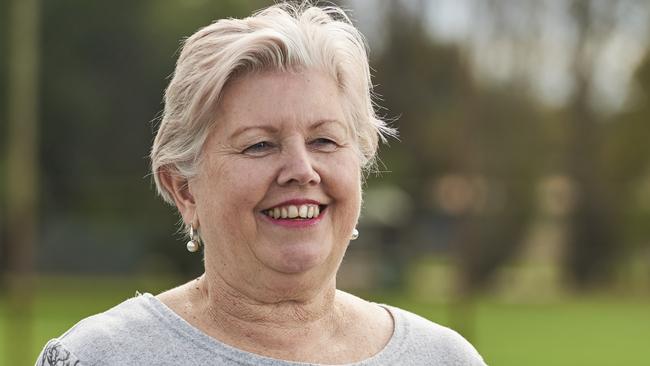
Julie Rouse remembers telling the team she had a holiday house in Guilderton, a coastal town north of Perth. “Why don’t us girls go away for the whole weekend next time?” she said. Easier said than done. Different times, different expectations of mothers. “For me, I’d never left the house for a weekend,” Sue Nielson says. “And I had no one to leave the kids with. My husband, Pete, was a real bloke and he didn’t really do the bringing-up-the-kids part. It’s just the way it was back then. It’s a different world today. I’m sure groups of mums go away all the time today but back then I was so worried about leaving the kids and the husband and all that. But these girls taught me it was OK to do it. So I cooked everything and I organised everything at home and I did go – and I’ve never hurt so much from laughing so hard. I think those weekends gave me a sense of freedom I didn’t have before. I don’t know, maybe I put those restrictions on myself, but those girls showed me, ‘I’m allowed to do this’.”
“It was all right for the men to do it, but not for the women to do it,” Evelyn says. “That made the group even stronger, because we probably all needed to get away. I think it was good for all of us as younger mothers just to have that weekend where you didn’t have to worry about cooking and [housework] because it was just constant. Relentless.”
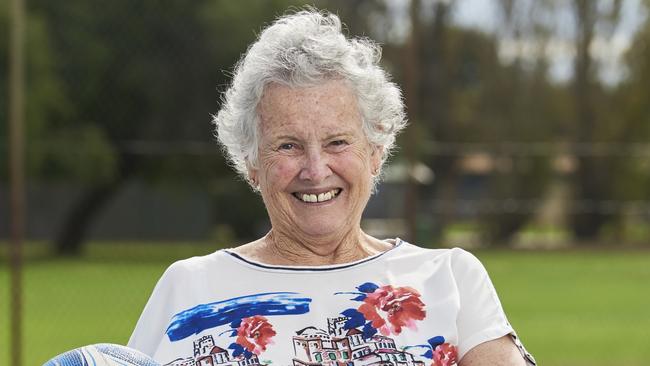
“It was a release,” says Wendy Goodman, wing defence, 69. Wendy’s a mother of two. Her ex-husband used to fix typewriters and fax machines. She worked part-time in a bakery while raising the kids. “The dads went out to work and usually the mums, some worked part-time, but most of the time they were at home doing the school runs and things like that,” Wendy says. “And some of the girls struggled with husbands who weren’t happy about these getaways. But it sort of became like a women’s independence thing. This group brought us out of a lot of our inhibitions. Even just going away for the weekends, leaving the husbands home with the kids. That was just something unheard of. People just didn’t do that.”
“I’m someone who keeps a lot of stuff to myself,” says Julie Rouse. “But in that group on those weekends, you feel secure in letting out a few of your secrets about your family and stuff like that. And you know they won’t go any further. There’s a lot of comfort in that.”
Sue didn’t have extended family close by. The Boilers became her family. “And we’d talk, and when you were worrying about what kind of mum you were they would say something about their kids and I would think, ‘Oh my gosh, that’s OK then, that’s normal, I’m perfectly OK’.”
Sue’s eldest boy battled drug addiction and years passed before she found the courage to mention the pain of this drawn-out struggle to the Boilers. “I’m more open now,” Sue says. “I’ll say things and tell them many things now. But it took me a long time to get like that, because you get frightened of too much emotion, don’t you?” Sue spoke of her struggles, and discovered another Boiler had walked the same journey. “Here if ya need,” Marg Twohig said, and she kept her word. “My dear Marg, my lovely friend, used to go and visit him, even though he was a real mess by that stage,” Sue says. “She’d be there with him when I couldn’t be there.”
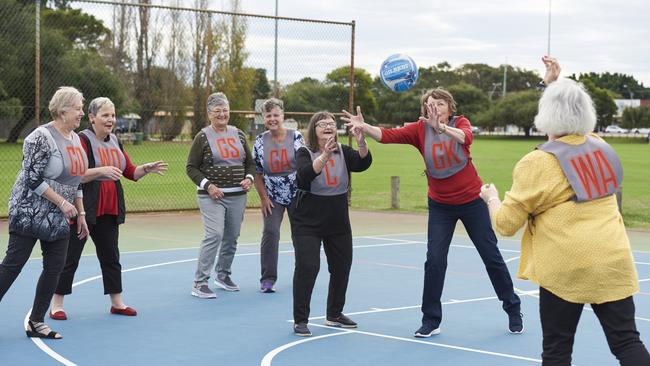
The weekend getaways brought the team bonding and the team bonding soon brought the on-court wins. They won the odd game and soon they won the odd season. “We got quite good,” Sue says. “Leonie was a good goal shooter. Valmai was a great, zippy centre. We always say we won an international match once because we played a group of talented schoolgirls who’d come out from England – and us old chooks managed to beat them.”
Sometimes divine intervention played its part, like the time Evelyn rushed for an errant ball that was bouncing out of bounds and in one single ambitious and desperate balletic leap she managed to slap the ball back into play, turning around just in time to see the awed faces of her teammates as they watched the saved ball land flush inside the goal net. “Awww shit!” Leonie said in stunned tribute. “If I was on-song,” says Evelyn, “I was a bit of a deadeye dick at scoring goals. But I could never do a shot like that in another lifetime.”
It was back in the increasingly distant 1990s when that happened. That was when the girls were fast and strong and agile. But then time and gravity turned its attentions to the Bayswater Boilers and Evelyn watched the slick form of her beloved netball girls turn to sludge, watched her own steely legs and arms and her steely glare turn to jelly. So, she told herself, this is what they mean by getting on. “I don’t like it, simple as that,” Evelyn says. “Because I was the sort of person who didn’t wait for her husband to come to move a wardrobe around the room. I’d nearly kill myself, but I’d bloody do it. Now I’m 70 this year and I wouldn’t dream of doing that because it’s just too ridiculous for words. But the ageing takes your physical strength as well as your mental strength and that annoys me. It really annoys me.”
Time was always the arch rival. No beating it. No avoiding it. That sneaky enemy gets at your children first, makes them grow up and leave the house. Then it gets inside your bones, gets into your knees and your elbow joints so that bullet pass you once threw to a speeding wing attack now moseys along the court like a horse-drawn wagon.
Then things turn really nasty: the invisible enemy starts taking your friends away. New opposition strategies called illness. New devastating plays called cancer and dementia. “Contact!” you shout. Unfair play. That’s against the rules. But the great ref in the sky has already stopped blowing Her whistle. Then time takes your husband away, puts him a coffin or puts thoughts in his head that make him pack his bags and walk away. Wendy Goodman was in her mid-40s when her husband left her. Her youngest child was 15.
“It just shook me to the bones,” she says. “But the Boilers got me through it. They would listen or give me a hug and if I needed anything they came around and they helped me pack up the house and move and things like that. And it was so good, too, because it’s such a frightening time.” For a while there Wendy thought her fear was about losing her husband. Then she realised her fear was about losing the Boilers. “I was scared because I thought I might have to move away from these friends,” she says. “I knew I wouldn’t be able to recover from not having them around me.” She could handle losing a husband. She couldn’t handle losing the Boilers. “They were my rocks,” Wendy says.
Leonie Barrodean was a rock for every last member of the team. Wendy and Valmai were by her bedside when she died. “I remember Leonie was getting pains and we kept saying to her, ‘Do you want us to take you to the doctor?’” Wendy says. “And then eventually she rang Evelyn one night and said yeah, she did want to go to the doctor and Ev took her and she had quite a few different health things happen, like a heart condition, and then they found the cancer.”
Evelyn still thinks regularly about how much she could use a good chat with Leonie. “My sister Mary [who played goal defence]and I used to visit her every Friday because Friday was my day off,” Evelyn says. “I knew she was dying. It was awful. Then one Friday we saw her and I had to leave, I had to get out, and my sister stayed and I just burst out crying, I knew I would never see her again.”
“She was the one who always had the funny stories,” Wendy says. “We’d be in fits of laughter all the time with her stories.” That humour of Leonie’s had been so useful for picking people up over the years. She was always there with a light touch.
“And when she got sick, we were there for her,” Wendy says. “Myself and Valmai had the most time on our hands and we lived quite close to her. We were with her when she died and it was really lovely. Just the fact that we were there and you sort of knew that it was coming. You just knew it was only minutes away. So we just sat there and talked to her and held her hand and it was so beautiful.” The Boilers catchcry was not spoken aloud that day but it was swirling around that room in silence. Here if ya need. Here if ya need. Here if ya need.
“We always talk about her and at every Christmas lunch we have we’ve got a photo of Leonie in a frame,” Evelyn says.
“Leonie wrote a letter to us all just before the end,” Sue says. The Boilers light a candle for Leonie at every Christmas lunch and read it.
Hi girls. Remember me? The oldest one. Just checking to make sure the Christmas table is set properly and you have a candle burning in my memory. In spirit, I will always be here with you. Take care of each other, as you so lovingly took care of me. Enjoy yourselves and have a drink on me. I sincerely thank you for all the many years of fun and laughter we shared together. With my love, your friend, Leonie.
There’s a flip side, of course, to the ravages of time. Time is the thing that brings the magic. Time is the glue. Time reveals love, reveals connections, reveals friendships. The Boilers would be nothing without time. Time has turned it all into something special. A sum greater than its parts. But the ravages don’t stop. The crushing blows keep coming. Weeks ago, Wendy was diagnosed with an aggressive brain tumour. “She’s back home now from hospital,” Sue says. “She has chemo and radiation to be organised.” Their beautiful Wendy. Their brave wing defence. Sue says Wendy has the perfect word for the tumour: “The motherf..ker!”
Julie Devereux – Julie D – was diagnosed with breast cancer last year. Evelyn’s sister, Mary Bagley, goal defence, 74, was diagnosed with breast cancer. Evelyn’s daughter, Tara, had breast cancer, too. The Boilers were there for Evelyn right through it. There for Tara, too, because the next generation of Boilers is as important as the first. Sue’s daughter, Jane, is best friends with Marg’s daughter, Jacinta. They were bridesmaids at each other’s weddings. Marg’s youngest daughter, Alicia, shared a Sydney apartment with Tara for a long time.
“Boilers forever,” Evelyn laughs. “It’s grown from all of us being young mothers just getting by to being older and wiser but still needing whatever it was that brought us together all those years ago. It won’t be long until we’re all in our 70s and the first ones will be in their 80s but we hopefully have a few more years left yet of going away.”
“I still wish I could play,” Marg says. “Netball’s been a part of my life since I was 11. In my head I can still play, I just can’t play in my body.” Her grandson and granddaughter play netball, and her daughter, Jacinta, is her granddaughter’s coach. “So, on it goes,” Marg says.
“It’ll go on forever,” says Julie R. “We’ll probably be in wheelchairs and most of us will need a lift to get us out of bed, but we’ll carry on.”
“This group has endured every last facet of Australian life,” says Sue. Recession. Job cuts. Fights for equality. A pandemic.
“Starting off, every single one of us was married. Then slowly all these things start to happen. Divorces. Kids get in trouble. People get sick. People leave us. But the friendship grows. And the Boilers are still here. Still here if ya need.”


To join the conversation, please log in. Don't have an account? Register
Join the conversation, you are commenting as Logout